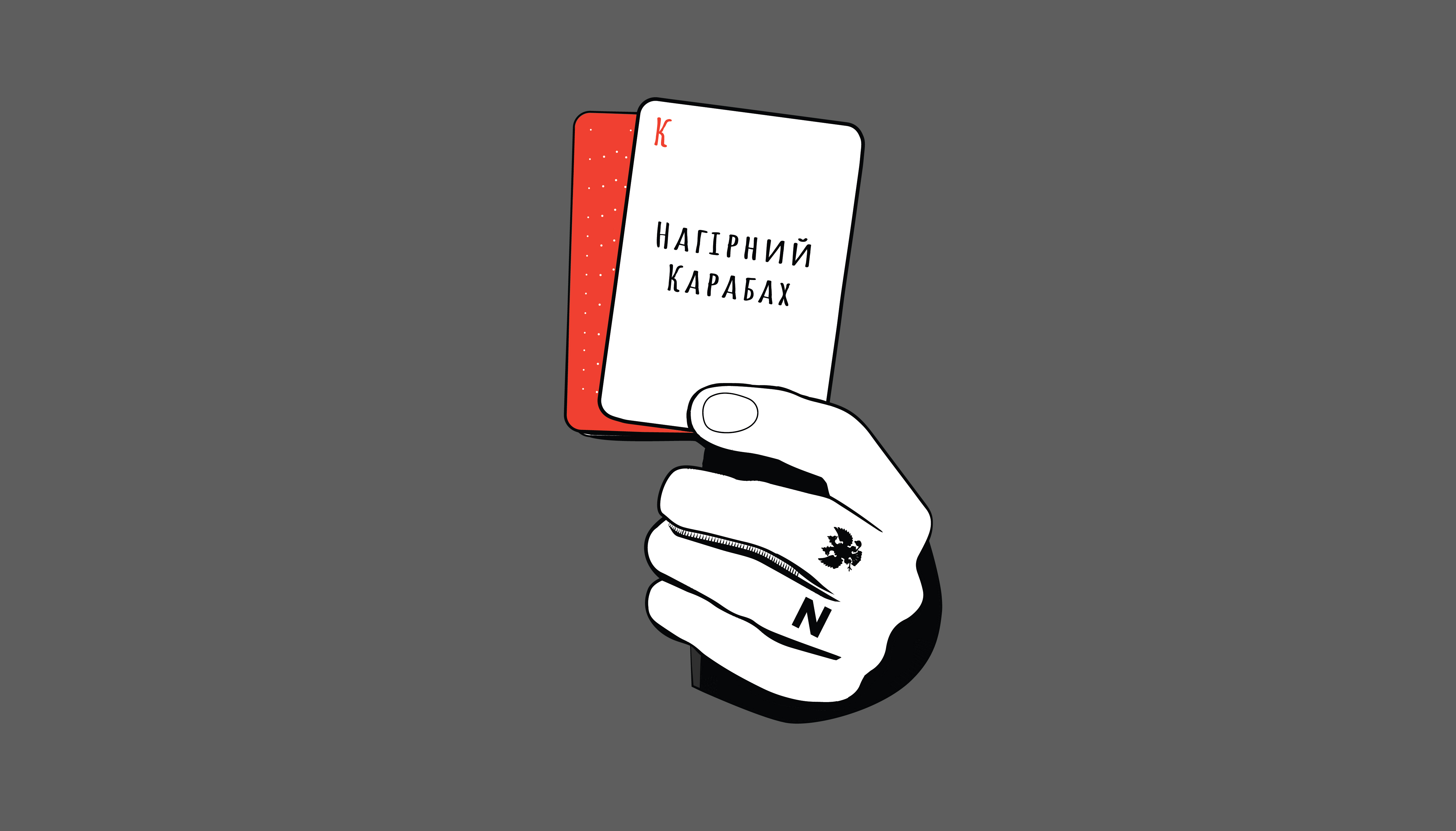Українською читайте тут.
In mid-September 2023, the Azerbaijani army initiated an “anti-terrorist operation” in Nagorno-Karabakh, a historical region within Azerbaijan inhabited by Armenians. In the early 90s, this region declared independence following a war and existed as an unrecognized republic for thirty years. The military operation by Azerbaijan, conducted between September 19 and 20, led to the surrender of the local armed forces of Karabakh (Armenians refer to this region as Artsakh). Consequently, protests erupted in Armenia, demanding the removal of the government accused of allowing “a defeat and national humiliation.”
Russian influence is evident in this story, with Moscow consistently applying a divide-and-rule strategy in its Caucasus policy. In the information domain, Russia portrays itself as a “peacemaker” aiding the peace process in the region. However, in reality, the Kremlin is striving to preserve its regional political influence through hybrid warfare tools.
Moreover, Russia is attempting to retain its influence over Armenia, which, according to Kremlin mouthpieces, is becoming “another Ukraine” by increasingly aligning its foreign policy with the West. Consequently, the ongoing developments in the Caucasus hold strategic importance for Ukraine.
We delve deeper into Nagorno-Karabakh and the tactics of Russian disinformation surrounding the recent escalation in the region in the article.
The Gordian Knot of the Caucasus
The conflict in Nagorno-Karabakh did not begin in 2022, nor even in this millennium. Historically, Nagorno-Karabakh (Artsakh) was Armenian since the times of the Great Armenia, established in the 4th century BCE, and persisted as part of Armenian states until the 17th century CE. The region was subsequently conquered by Persia, the Ottoman Empire, and the Russian Empire, under which it remained until the latter’s collapse in 1917. Yet, throughout these three hundred years, the population of Karabakh predominantly remained Armenian.
The first war between Armenia and Azerbaijan over this region ignited in 1918 and endured until both nations were Sovietized and incorporated into the USSR. Initially, in 1920, there were plans to incorporate Karabakh into the Armenian SSR, but the decision was later revised, retaining it within the Azerbaijani SSR as an autonomous republic.
During the Perestroika, protests surged for Karabakh’s secession from the Azerbaijani SSR and annexation to the Armenian SSR. By 1988, the tensions escalated to pogroms of Azerbaijanis in Armenia and vice versa.
The dissolution of the USSR significantly intensified the Nagorno-Karabakh issue. In September 1991, the Nagorno-Karabakh Republic (”Republic of Artsakh”) was proclaimed, and the Nagorno-Karabakh Autonomous Oblast (NKAO) was abolished in November 1991. This led to the emergence of an unrecognized state, de jure part of Azerbaijan but considered Armenian territory due to the ethnic composition of its population.
The creation of the self-proclaimed republic culminated in the 1992–1994 war between Armenia and Azerbaijan, which Yerevan won.
In foreign policy, Baku leans more towards Turkey, while Yerevan aligns with Russia. Both Azerbaijan and Armenia joined the Collective Security Treaty Organization (CSTO) – Moscow’s security alliance to maintain military-political influence over the former USSR territories – in the early 1990s. Azerbaijan left the CSTO in 1999, but Armenia remains a member.
Ultimately, Armenia has emerged as a country where Russian influence is arguably the most prominent among the three Caucasus nations. The Russian 102nd Military Base is located in Gyumri. The situation is complicated by the international recognition issues of the Armenian genocide in the Ottoman Empire during World War I. Given Turkey is Azerbaijan’s main ally, Armenia seeks to amplify its voice globally through its extensive diaspora and countries like France.
Ukraine’s official stance is that Karabakh is Azerbaijani territory within internationally recognized borders, and the conflict should be resolved through political and diplomatic means.
Yerevan’s Shift Away from Moscow
In 2020, the Second Karabakh War unfolded, with Azerbaijan defeating the armed forces of Karabakh. Armenia lost control over a portion of the territories. Russia, as usual, positioned itself as the “peacemaker” during the 44-day war. After the hostilities, the presence of Russian troops in Karabakh was accepted as the principal guarantor of peace in the region.
However, Russia’s full-scale invasion of Ukraine on February 24, 2022, prompted a shift in Armenia’s foreign policy. Yerevan began engaging more with Western countries. In September 2022, Nancy Pelosi, the Speaker of the United States House of Representatives, paid an official visit to Armenia. Interestingly, the current U.S. ambassador to Armenia is Christina Quinn, who served as the Chargé d’Affaires of the U.S. in Ukraine from 2020 to 2022.
In an interview with La Repubblica in early September, Armenian Prime Minister Nikol Pashinyan stated that partnering with Russia was a strategic mistake. The United States and Armenia conducted joint military exercises for the first time on September 11. However, on September 19, Azerbaijan commenced military actions in Nagorno-Karabakh, ending in the latter’s capitulation.
“Armenia is Bad Because It Follows Ukraine’s Path”
Russian disinformation and public opinion manipulations within Armenia aim to sow distrust in Yerevan’s current administration, linked to the country’s shift towards closer cooperation with the West. The propaganda pushes the narrative that Armenia, having chosen the U.S., suffered a military defeat, implying that alignment with Russia would have ensured their victory.
Anton Hanotskyi, an expert on the Asia-Pacific region from the Ad Astra analytical center and author of the Pyongyang Truth project, elucidated the nuances of the Karabakh events’ coverage by Russian propaganda to Detector Media.
“Russian propaganda has amplified its accusations against Pashinyan, who claimed that the strategic partnership with Russia was a mistake. This marked the beginning of an informational assault on the current Armenian government. The propagandist Dmitry Kiselyov, the Director General of Russia Today, told on Russia One [TV channel] that Armenia would become a ‘second Ukraine’ – a ‘bad’ state, because Anna Hakobyan, Nikol Pashinyan’s wife, had attended the Third Summit of First Ladies and Gentlemen in Kyiv,” said Hanotskyi.
The advance of the Azerbaijani army resulted in a humanitarian crisis and a wave of refugees from Karabakh seeking to move to Armenia. Russia began blaming Yerevan, which failed to protect its people, creating a dichotomy between the “right” (from Karabakh) and “wrong” Armenians, the latter accused of aspiring to become “Western puppets.”
“Russian propaganda has begun to place the blame squarely on the government in Yerevan for the loss of Karabakh. Moscow has thus shifted all responsibility onto Pashinyan’s administration, aiming to destabilize the socio-political situation in Armenia. The Kremlin is eager to see a pro-Russian opposition, led by Robert Kocharyan — a former President of Armenia and the first President of the NKR [Nagodno-Karabakh Republic], ascend to power in Yerevan,” stated Anton Hanotskyi.
One of the Kremlin’s main mouthpieces, Vladimir Solovyov, has suggested sending Armenians from Karabakh to fight against Ukraine as part of the Russian army’s terrorist units in the Luhansk region.
The equipment captured by the Azerbaijani army from the military units of Karabakh is planned to be decommissioned by Russian “peacekeepers.” However, it’s highly likely that the weaponry will be repurposed for Russia’s continued armed aggression against Ukraine.
“Moscow Didn’t Betray Yerevan, Pashinyan is the Traitor”
Anton Hanotskyi, who has been monitoring Telegram channels regarding the events in Karabakh, highlighted messages stating, “A series of messages can be identified claiming that Pashinyan is a traitor who lost by moving away from Russia. Like, this is your punishment for not supporting Russia. However, considering Moscow’s actions, it’s apparent why Armenia is reevaluating its foreign policy, unlike Georgia,” the expert explained.
Russians don’t conceal their disdain for Pashinyan, who, as propaganda insists, came to power in 2018 and was reelected in 2021 solely to betray national interests, meaning to cede Karabakh to Baku. To discredit him, they resort to defamatory remarks to shape the “correct image” of this politician according to their propaganda. By branding Pashinyan a traitor, they aim to establish a persistent negative association to undermine trust in his stance and actions.
“Putin is More Armenian than Others”
This is how Vitaliy Milonov, a propagandist, Ukrainophobe, and deputy of the State Duma of Russia, characterized the Armenian Prime Minister: “With the advent of Pashinyan’s administration, it was clear — they came to surrender Karabakh... This makes the present attempts to blame Russia even more absurd. If anyone, Russia did everything possible to maintain peace.”
Here’s how Kremlin mouthpieces have commented regarding Russian peacekeepers, the West, and Armenia.
Russian propagandist and publisher Aram Gabrelyanov noted: “What do peacekeepers have to do with it? Try doing something yourself first... Why should Putin be more Armenian than you?”
Propagandist and TV host Vladimir Solovyov was furious: “Where was the Armenian army? Aren’t a few hundred people training with the Americans now? Well, have the Americans helped you? Have you seen the Americans standing shoulder to shoulder with you, entering this conflict zone, and fighting against Turkey, their NATO ally?”
The editor-in-chief of Russia Today, the main broadcaster of Russian propaganda worldwide, Margarita Simonyan, reassured: “Why are we apologizing, I don’t understand? And to whom? To a bald heartless Judas... having sold his own people for the promise of a meager pension somewhere in the suburbs with a barbecue near a pool? Russia doesn’t owe anything to anyone.”
During the Azerbaijani military operation on September 20, a vehicle was fired upon, killing several Russian soldiers who were part of the “peacekeeping force.” Among them was the Deputy Commander for Political and Military Affairs of the Submarine Forces of Russia’s North Fleet, Captain 1st Rank Ivan Kovgan. Azerbaijani President Ilham Aliyev apologized to Putin for the situation.
Russian propaganda is trying to paint this story as yet another “stab in the back.” The attack was akin to a hunt, as if the Russians “fell into an ambush.”
“Russian propaganda towards Azerbaijan used to be more neutral. There were negative reviews from some Z [pro-invasion] military correspondents about the shooting of a column of Russian ‘peacekeepers.’ The Russians wrote that those who did this must be punished,” said Anton Hanotskyi.
Russia has effectively stated that it will not intervene in the affairs of Armenia and Azerbaijan. It has already sent “peacekeepers” supposed to resolve the situation. In other words, Moscow did everything to prevent bloodshed, but Azerbaijan started the war, and Armenia did not protect its own people. This seems to be the reasoning of Moscow propagandists.
The situation in Nagorno-Karabakh showed that Russia continues to manipulate the situation in the region. The escalation only benefited the Kremlin, which seeks to retain its influence in the post-Soviet space through frozen conflicts. At the same time, the government in Yerevan has clearly stated its position that Armenia’s future lies in cooperation with the West. Azerbaijan, with the support of Turkey, has become an even stronger geopolitical player in the Caucasus. Russia is gradually losing influence in the Caucasus but will not abandon attempts to interfere in the internal affairs of Armenia, Georgia, and Azerbaijan.



